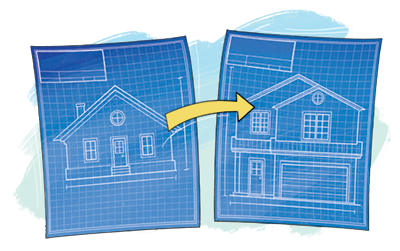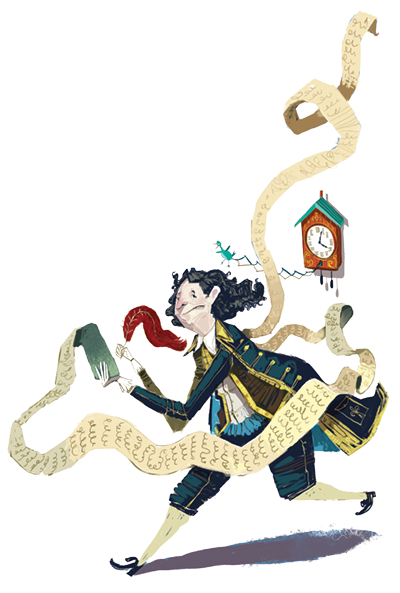BJU Press middle- and high-school writing and grammar product line systematically reviews and applies English grammar conventions to the real world. The practice of writing—using grammar to craft clear and effective communication—is essential for helping students to understand, analyze, and craft an argument. Students also need to develop effective research and study skills that will enable them to manage large assignments and to find relevant and useful information. We have given teachers the tools to help their students craft effective written and oral communication that engages with and contributes to culture. To accomplish our vision for students, we have laid out a series of goals for our program, activities, and teaching strategies.
Program Approach for Writing & Grammar
Mastery of English Grammar & Mechanics
Standard English conventions in grammar form the basis for clear and effective communication. However, learning grammar rules in isolation only helps students to memorize rules rather than applying or understanding why those rules matter. To encourage students to master English conventions, BJU Press middle- and high-school writing and grammar courses teach grammar at the point of application as well as in independent practice and review. As the students progress through each grade level, they will
- Practice analyzing grammatical structures of sentences.
- Write and evaluate their writing for standard usage.
- Participate in lessons and workshops to review and apply the grammar, usage, and mechanics of standard English.
- Follow a scaffolded review of standard conventions, gradually building complexity.
To reach these goals, grammar chapters in Writing & Grammar 7, 8, and 9 include several Practice, Use, and Review the Skill pages in the lessons. Teachers can use these pages for in-class or independent practice, or they can use them on review days. Grammar workshop pages in middle school courses give students a chance to see how grammatical concepts and rules affect writing. Additionally, each BJU Press teacher edition includes suggestions for teacher modeling so that teachers can show students how to work through activities. Handbooks, available in the back of the Writing & Grammar 7 and 8 student worktexts, review common errors and problems the students will need to review.
Connecting Mentor Texts to Grammar Instruction and Writing Activities
Mentor texts give students a starting point for analyzing the grammatical structures of sentences. In each BJU Press student edition, students will find mentor texts and writing activities that promote understanding not only of the function and value of grammar but also how to structure written pieces. Student activities afford students the opportunity to analyze each mentor text to learn from it. Teachers can use these texts to prompt analysis of how sentence structure and word choice influence communication, and how the writers of the mentor texts might have changed what they meant or said by using the language differently. From these mentor text activities, teachers can direct students to analyze how they use standard grammar conventions in their own writing and communication. Students will also learn writing strategies, how to diversify word choice, persuasive techniques, and more.
Using the Writing Process in Real-World Contexts
BJU Press Writing & Grammar programs lead students through the five stages of the writing process:
- Planning
- Drafting
- Revising
- Proofreading
- Publishing
These stages effectively walk students through the process of creating written works of varying lengths and genres. Every writing project follows the writing process, giving students instructions and important questions to ask at each point. Writing projects are age- and grade-appropriate and relevant to the students’ lives and interests. For example, the capstone project for Writing & Grammar 8 is a multigenre project. Students may choose their topic and the types of writing they will do, in collaboration with a group of other students. The students choose a significant person to write about, craft a timeline and biographical essay, create four original genre pieces (informative, narrative, argumentative/persuasive essays or poetry) based on significant events in the timeline, prepare a works-cited page, and conclude with a personal reflection on what they learned or experienced from the project.
Drafting Writing That Is Truthful, Virtuous, Logical, and Empathetic
By teaching students how to be good writers, teachers are also encouraging them to be good communicators. Good writing is clear, accurate, and considerate of its audience. As a building block for clear writing, grammar conventions give students a foundation for writing without confusing errors. Students can use grammar tools to improve their communication. Research and study skills support young writers in developing truthful and virtuous writing by teaching them to find, understand, restate, and properly cite information sources to build or defend an argument. These skills give authenticity and merit to their writing. Ultimately, most writing is designed for the benefit of the reader, not the writer. To that end, we equip teachers to help their students better understand the needs of their audience. Throughout each course writing instructions, teaching notes, and writing checklists will regularly remind students to consider their audience and the appropriateness of their word choice and usage.
Mastery of Study, Reference, and Research Skills
In addition to mastering grammar conventions, students need to know where to look for useful information, how to categorize and organize it, and they need to understand it well enough that they can reuse it in their own words. Study skills enable students to understand how they learn and process information so that they are better equipped to use that information later . Student researchers need to be able to process and categorize the information they encounter. In addition to learning effective research skills, students will also need to master effective study skills. The BJU Press Writing & Grammar program teaches study and research skills regularly in each course, including how to recognize credible sources and how to ask good questions that lead to a better understanding. The handbooks in Writing & Grammar 7 and 8 and the Study Hacks feature in Writing & Grammar 9 offer detailed reviews of relevant study skills, such as how to schedule study time, suggestions for memory work, and strategies to improve reading comprehension.
Improvement in Collaboration, Listening, Speaking, and Viewing
Teaching strategies throughout the program direct teachers to lead in a variety of collaborative projects and assignments. Many projects include oral presentations that require both speaking and listening as students present and peers evaluate presentations. Teachers can lead visual analyses of infographics and full-page visuals that inform students about the topics for that chapter. Projects that include oral presentations also help students learn how to develop and give PowerPoint presentations on a topic of interest to them. As they engage in writing projects and practice their research skills, students will expand their digital and media literacy. Writing projects and presentations often require students to work with word processors or presentation software to develop an effective presentation. In these presentations, they will improve collaborative skills in group projects and through peer reviews of their writing.
Vision
To equip students to apply writing and grammar skills to craft effective written and oral communication that engages with and contributes to culture.
Goals
- To ensure mastery of English grammar and mechanics
- To develop mastery of study, reference, and research skills, effectively using print and digital sources
- To model the connection of mentor texts to grammar instruction and writing activities
- To give opportunities for students to use the writing process with genre-specific strategies to craft communication for real-world contexts
- To guide students to hone collaboration, listening, speaking, and viewing skills
- To expand technology and media literacy through written, oral, and visual communication
- To lead students to draft writing that is truthful, virtuous, and empathetic
Materials
Student Edition (eTextbooks available)
Consumable student worktexts provide important practice exercises and opportunities for active application to each student’s own writing. Our texts encourage students to write regularly and in diverse genres. The main chapters offer a written model and an associated lesson for students to use in studying the model. As students develop their skills, they gain confidence in their skills and prepare for future real-life writing opportunities.
Teacher Edition
Teacher editions provide instructors with the support they need to teach writing and grammar effectively. Lessons include margin notes for lesson content and planning use, pretests for assessing student knowledge, suggested lesson objectives, ESL strategies, cross-curricular links, biblical-worldview discussions, and many other tools. These tools help teachers develop their students’ knowledge, critical-thinking skills, and biblical worldview.
Assessments and Assessments Answer Keys
Assessments and assessments answer keys include summative assessments for grammar concepts. Each assessment aligns with stated objectives available in the teacher edition.
Scope & Sequence

English 6
Parts of Speech
Noun: common, proper, singular, plural, possessive, abbreviation, appositive, singular and plural possessive, as subjects, objects, and appositives; Verb: principal parts, simple tenses, perfect tenses; Pronoun: subject, object, possessive, reflexive, intensive, interrogative, demonstrative, indefinite, with antecedent; Adjective: article, proper, demonstrative, predicate adjective; Adverb: comparative, superlative; Preposition; Conjunction: coordinating, subordinating, interjection
Sentence Structure
Sentence: fragment; run-on; simple, compound, complex; declarative, interrogative, imperative, exclamatory; Complete subject and predicate; Simple subject and predicate; Compound subjects and predicates; Dependent and independent clauses; Introductory prepositional phrases; Sentence patterns; Diagramming
Conventions
Capitalization: proper nouns, proper adjectives, abbreviations, titles, initials; Punctuation: period, question mark, exclamation point, comma, apostrophe
Usage
Homophones; Pronoun reference; Subject/verb agreement; Contractions; Often confused verbs; Double Negatives; Misplaced Modifiers; Prefixes; Suffixes
Writing Skills & Support
Shared writing; Independent writing; Paragraph development; Writing process: plan, draft, revise, proofread, publish; Writing traits: ideas, organization, word choice, conventions; Graphic organizers: events/details chart, persuasion chart, plot diagram, time-order chart, Venn diagram, word web; Rubric for self-assessment; Proofreading marks to improve writing and make corrections; Using a dictionary; Using a thesaurus; Avoiding propaganda tactics
Writing Projects
Shared writing; Independent writing; Paragraph Development; Poetry: Limerick, free verse; Personal narrative, newspaper editorial, instructions, research report, historical fiction, compare-contrast essay, cover letter
Study and Reference Skills
Reference Skills: parts of a book, title page, table of contents, index, glossary, bibliography; Dictionary Skills: guide words, parts of an entry, multiple definitions; Study Skills: taking notes, outlines
Listening and Speaking Skills
Speaking Skills: oral publishing for written instructions

Writing & Grammar 7
Parts of Speech (and Verbals)
Noun; pronoun; verb (simple tense and perfect tenses); adjective; adverb; preposition; conjunction (coordinating, correlative, subordinating); interjection; verbals (participle, infinitive, gerund, verbal phrases with modifiers, functions as different parts of speech)
Sentence Structure
Sentence patterns (S-InV, S-TrV-DO, S-TrV-IO-DO, S-LV-PN, S-LV-PA); introduction to dependent clauses; sentence types (declarative, interrogative, imperative, exclamatory); clause structure (simple, compound, complex, compound-complex); sentence errors (fragments, comma splices, fused sentences)
Mechanics
Capitalization; punctuation; spelling
Usage
Subject-verb agreement; pronoun-antecedent agreement; pronoun reference; troublesome words; misplaced modifier; dangling modifier
Writing Skills
Writing process (planning, drafting, revising, proofreading, publishing); paragraph development (fact, example, statistic, incident/anecdote, sensory detail, reason); paragraph organization (chronological, spatial, order of importance); paragraph unity; style (precise words, showing not telling, effective fragments, strong action verbs, adding details, rhythm, expanding sentences, tightening writing with appositives, combining sentences, figurative and fresh language); voice; point of view
Examples of Writing Projects
Argumentative writing, article writing, informative writing, narrative writing
Reference and Study Skills
Parts of a book (title page, copyright page, table of contents, list of illustrations, acknowledgements, introduction/preface, text, bibliography, appendix, glossary, index); scheduling study time; memory techniques; reading comprehension (definitions, restatements, examples, word parts); test-taking strategies (classroom tests, standardized tests)

Writing & Grammar 8
Parts of Speech (and Verbals)
Review of all from Grade 7 plus the following new material: verb—progressive tense; indicative, imperative, and subjective)
Sentence Structure
Review of all from Grade 7 plus the following new material: adjective clause, adverb clause
Mechanics
Review of all from Grade 7 plus the following new material: punctuation—parentheses, brackets, dashes, ellipses
Usage
Review of all from Grade 7
Writing Skills
Review of all from Grade 7 plus the following new material: six traits of writing, proofreading symbols, writing different types of paragraphs (definition, process, descriptive, compare-and-contrast, argumentative), writing an anecdote, visual representation, writing poetry, writing a business letter, expanding and combining (with parallel structures, with adjectives, with adverbs, with prepositional phrases, with participial phrases, with infinitive phrases)
Examples of Writing Projects
Informative writing, narrative writing, argumentative writing, multigenre project
Study & Reference Skills
Study skills are incorporated into Student Handbook. Reference skills are incorporated into a comprehensive research chapter

Writing & Grammar 9
Parts of Speech (and Verbals)
Review of all from Grade 8 plus the following new material: noun—collective; adverb—qualifier, relative; verbals—verbal phrases with objects
Sentence Structure
Review of all from Grade 8 plus the following new material: dependent clause—noun clause
Mechanics
Capitalization; punctuation; spelling
Usage
Review of all from Grade 8
Writing Skills
Review of all from Grade 8 plus the following new material: style—conciseness, smoothness; sentence variety—length and complexity, sentence patterns, sentence beginnings
Examples of Writing Projects
Description: brochure, creative writing, list poem, comparison/contrast presentation, writing about the future; Exposition: essay answer, historical research essay, informative article, research paper; Narration: narrative essay, oral history, memoir, film script; Persuasion: persuasive essay, opinion piece, book review; Personal Communication: letter to the “you” of the future, business letter, business email
Study and Reference Skills
Review of all from Grade 8 plus the new “Study Hacks” feature for each chapter: Learning how to learn, two tips for studying smarter, managing yourself, using available resources, creating a consistent study routine, getting organized, active learning in the classroom, taking notes, using active reading strategies, studying outside the classroom, making memories stick, spacing out your practice, preparing for tests, taking tests with confidence, setting SMART goals, utilizing memory techniques, establishing healthy routines, developing grit

Writing & Grammar 10
Parts of Speech (and Verbals)
Review of all from Grade 9 plus the following new material: pronoun—reciprocal; adverb—conjunctive; verbals—perfect gerund, passive infinitive
Sentence Structure
Review of all from Grade 9 plus the following new material: sentence patterns—S-be-ADVL, S-TrV-DO-OC
Mechanics
Punctuation; appendix of capitalization rules
Usage
Review of all from Grade 9
Writing Skills
Review of all from Grade 9 plus the following new material: cumulative sentences; expanding with absolute phrases; sound devices; emphasis in writing; connotative language; sensory language
Examples of Writing Projects
Informative: five-paragraph essay, descriptive essay, explanatory essay, research essay, cause-and-effect essay; Narrative: narrative essay, eyewitness report; Argumentative: internet article, satirical article
Study & Reference Skills
Study Hacks build on study skills taught in Grade 9

Writing & Grammar 11
Parts of Speech (and Verbals):
Review of all from Grade 10 plus the following new material: verb-verb-adverb combinations; adverb-indefinite relative, interrogative; conjunction-phrasal subordinating; verbals-perfect participle, passive gerund, perfect infinitive, progressive infinitive, elliptical infinitive
Sentence Structure:
Review all from Grade 10 plus the following new material: sentence patterns-retained object in passive sentence
Mechanics:
Capitalization; punctuation; appendix of spelling rules
Usage:
Review all from Grade 10 plus the following new material: pronoun shift; verb tense consistency and sequence
Writing Skills:
Review of all from Grade 10 plus the following new material: paragraph organization-cause-and-effect order, comparison-and-contrast order; sentence energy-pauses for breath; parallelism-clarity; sentence logic-direct expression, logical predication, avoiding mixed constructions, using noun clauses when needed, ending in strength, linking with new information
Examples of Writing Projects:
Description: interview; Exposition: formal research paper, analytical essay, critical response to literature; Narration: narrative poem, folktale; Persuasion: letter to editor; Poetry: hymn
Study & Reference Skills:
Review of all from Grade 10 plus the following new material: reference tools-literary index, literary sources

Writing & Grammar 12
Parts of Speech (and Verbals):
Review of all from Grade 11 plus the following new material: verbals-passive participle
Sentence Structure:
Review all from Grade 11 plus the following new material: absolute phrase
Mechanics:
Capitalization; punctuation; appendix of spelling rules
Usage:
Review all from Grade 11 plus the following new material: idiomatic use of prepositions
Writing Skills:
Review of all from Grade 11 plus the following new material: paragraph development-quotation, visual aid
Examples of Writing Projects:
Description: descriptive essay, comparison/contrast essay; Exposition: research report, response to a dramatic scene (literary analysis); Narration: dramatic scene, interior monologue; Persuasion: pursuasive essay; Poetry: sonnet; Multimedia: video report
Study & Reference Skills:
Review of all from Grade 11



